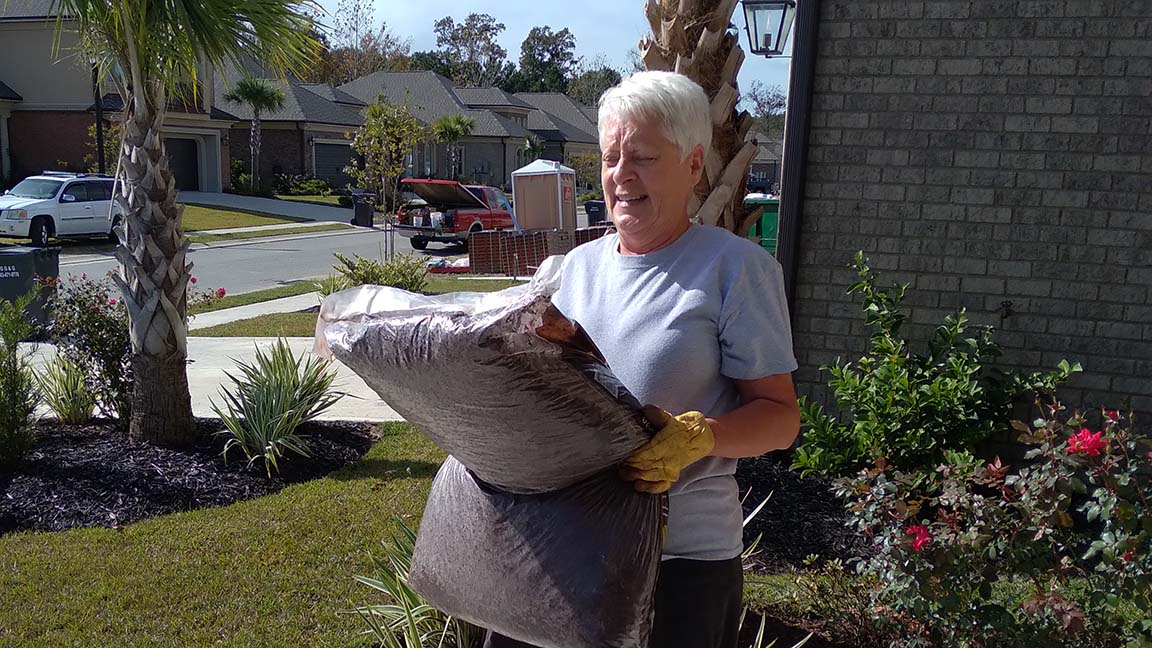Whether she’s chasing after her puppy, taking a long walk or working in her garden, Rhonda Yeates of Myrtle Beach likes to stay busy.
“I’m not a sitter,” says Yeates, 66, who underwent a left knee replacement in May.
Leading up to the surgery, Yeates’ activity levels had slowed down due to the persistent pain she was experiencing from arthritis in her knee.
“I was thankful for the surgery,” she says. “It was coming to a point where the pain was hindering my life.”
Like Yeates, many people have knee pain as a result of osteoarthritis, a degenerative condition that can cause the cartilage surrounding the knee joint to break down. The condition is most common in people over 50, but younger people can experience osteoarthritis, too.
As osteoarthritis advances, there’s less cartilage to cushion the joint. Without protection, the bones that make up the knee joint rub together when you move. Over time, even the simplest movements can cause pain.
As a result, knee replacements are an increasingly common procedure in the U.S. An estimated 790,000 knee replacements are performed each year, according to the Agency for Healthcare Research and Quality.
Yeates’ procedure was performed by Tidelands Health orthopedic surgeon Dr. Mark Rowley, who has helped many people in her situation overcome chronic pain and return to their active lifestyles.
“She is typical of a lot of the patients in our area,” he says. “She’s retired, but she’s very active.”
Before undergoing knee replacement surgery, Yeates tried steroid shots and underwent a procedure in 2019 to repair a meniscus tear in her knee. Still, when her condition continued to deteriorate, she and Dr. Rowley agreed it was time to replace her knee.
“The padding in her knee had worn away,” says Dr. Rowley. “She’d gotten to the point where she was having pain and fluid collection in her knee, and she was having to give up some of her recreational activities.”
A change in activity level due to knee pain is often the point at which a patient, in consultation with an orthopedic surgeon, decides to undergo a replacement, he says.
“At that point, not replacing a knee can have other detrimental effects on a person,” he says. “They become less active, so they’re more at risk for diabetes, heart disease and obesity.”
They also may become depressed or anxious.
“There’s a tremendous impact on a person’s mental health when they’re not mobile, too.” Dr. Rowley says.
Following the one-hour surgery, Yeates spent one night at Tidelands Waccamaw Community Hospital and soon began physical therapy at Tidelands Health Rehabilitation Services at The Market Common. The rehab clinic and Dr. Rowley’s practice are both located at Tidelands Health Medical Park at The Market Common, which brings together more than a half dozen practices and specialties to provide highly coordinated care all under one roof close to home.
Dr. Rowley says many aspects of knee replacement surgery have improved over the past decade. Patients spend less time in the hospital, begin using their new knee soon after the procedure and promptly transition into rehab. Knee replacements can also last much longer, often 20-25 years, so the procedure is a viable option for younger patients.
“We get patients up and moving the day of surgery,” he says. “We start physical therapy sooner, and we really work on returning them to a functional level that is tailored to their needs and lifestyle.”
Yeates says physical therapy has been an important part of her recovery, and credits Melissa Gray, her physical therapist, with keeping her on track.
“She worked with my level of pain and pushed me just enough to increase my progress,” she says. “She made me accountable for the exercises and was able to tell if I had been doing them between PT sessions.”
Gray also boosted Yeates’ spirits and helped her stay focused on her goals, Yeates says.
“She was very encouraging whenever I was concerned about the progress I was making,” Yeates says. “She was very caring and made the sessions fun.”
Throughout the process, Yeates says she benefited from continued support from Dr. Rowley and his team at Tidelands Health Orthopedics.
“He explained everything along the way,” she says. “He and his staff are very caring. I’ve never called his office and felt like they were too busy to answer my questions. I’ve also never felt rushed at my appointments.”
Recovery time from a knee replacement can vary based upon each patient’s unique circumstances, Dr. Rowley says. Most of the time, people can resume normal daily activities within weeks of the procedure, though it can take up to a year to realize the full benefits of the replacement.
Yeates is seven months along and says she’s doing extremely well.
“I think the hardest part is wrapping your head around the fact that it’s not your original body part, and it’s not going to work exactly like the original part,” she says.
Still, she says, she is thrilled to be without pain and has been able to largely resume her active lifestyle.
Dr. Rowley, too, is pleased with Yeates’ outcome and says she was an ideal candidate for the procedure.
“She was in good health,” he says. “She was in good physical condition. She’s also a very positive person, which really bodes well for recovery after any illness or surgery.”
